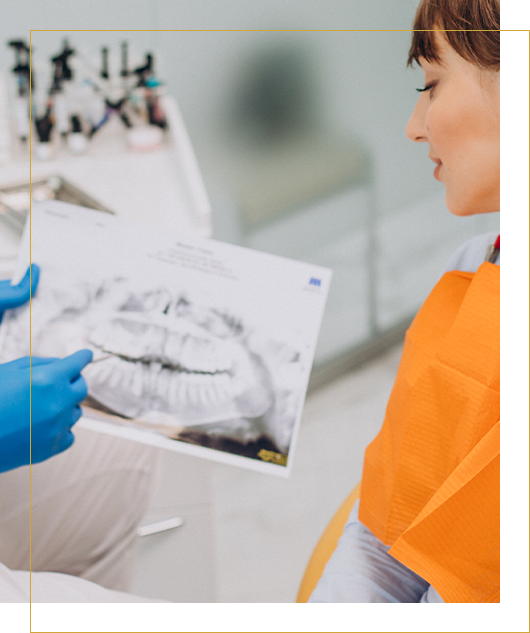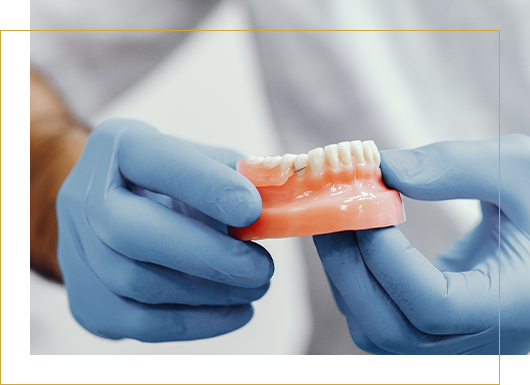Dentures in Mundaring
All of us know how important it is to have a complete set of teeth. We offer dentures as one of our restorative dental services for those seeking to show off their brightest smiles!


Restore your natural Smile With Dentures
At the Mundaring Dental and Implant Centre, we provide a pleasant setting in which to explore ways to regain your smile and live a more fulfilling life. Our professional staff of experienced dentists will listen to your worries and find a restoration treatment that suits your needs, such as removable dentures. Dentures are replacement for missing teeth and surrounding tissues. They’re made of acrylic resin sometimes with metal attachments. Dentures also provide support for facial muscles and can help you feel better about yourself. With every grin, our dentures will make you forget you ever had problems with your smile.
Reasons Why You Would Need Dentures


Why choose
Mundaring dental
& implant centre

Convenient Quality Dental Care
With over 50 years of combined experience, our team of professionals continues to provide high-quality dental services, from general dentistry and dental implant services to restorative and cosmetic dentistry.

A Compassionate Team Utilizing Modern Technology:
Mundaring Dental & Implant Centre offers the latest dental implant technology and techniques to provide you with the best possible results. Our state-of-the-art equipment makes your dental implant experience as easy and stress-free as possible.

Easily Accessible
Mundaring Dental & Implant Centre is proud to offer flexible payment plan options to make sure that everyone receives the dental care they need.

Same-day Dentistry and Fast Turn Around Time
Mundaring Dental & Implant Centre offers same-day service for various dental treatments, including dental crowns. You can get high-quality dental care and more natural-looking crowns in just one visit!
FAQs
Are you a good candidate for dentures?
What is the process of getting new dentures like
In order to develop well-fitting dentures, several appointments may be needed. In the event that your dentist or prosthodontist (a dentist who specializes in replacing and restoring teeth) determines that you require a denture, the following steps should be taken:
- There are several impressions that the dentist will take of your jaw, as well as measurements of how they relate to one another and how much space is between them.
- Models, wax forms, or plastic patterns that reflect the exact shape and positioning of the denture will be made. During the trying out process, you will have the opportunity to try this temporary denture out several times to establish the right fit. Before the final denture is cast, the colour, shape, and fit will be assessed to look as natural as possible.
- After the final denture is cast by the dental laboratory, you will be advised to wear it continuously for the initial few days. Some adjustments can be made to make the fit more comfortable.
How will my new dentures feel?
How soon can you have dentures after a tooth extraction?
Potential denture patients commonly ask this question. First-time denture patients have a choice between two options. They both offer advantages and disadvantages.
Option 1: Post-healing Fit
After your teeth have been extracted, you can wait 6 to 8 weeks or longer before getting temporary dentures. It eliminates the need to learn how to wear dentures during a sore period of gums.
You will have a better fit when you receive your first set of dentures because they were designed to fit gums that have closed and have shrunk a bit. This method has the obvious disadvantage of requiring you to be without teeth for a few weeks.
Option 2: Immediate Dentures
It is also possible to make dentures before teeth are extracted. After extractions, the dentures are inserted immediately. This is a challenge because it takes commitment to learn how to chew again with artificial appliances while dealing with sore gums that may flare up at any time during the healing process.
However, many people choose this route in order to avoid having no teeth. Some patients are unable or unwilling to perform the duties of their job while waiting for gum healing. With immediate dentures, extractions and replacement teeth can all be accomplished in one day, so you leave looking refreshed with a new set of pearly whites!
What are the advantages and disadvantages of using dentures?
Advantages of Dentures
- Dentures provide a natural and confident appearance.
- Denture requirements are less strict when compared to those of implants or dental bridges. The other treatment options may need preparatory dental treatments like bone grafts or tooth shaping.
- Denture maintenance is simple. Dentures can be cleaned inside or outside the mouth and typically only need to be rinsed after meals.
- Dentures are easier and cheaper to replace than bridges or implants.
Disadvantages of Dentures
- Dentures wear down with time, so they will need to be replaced as time passes.
- Getting dentures involves many procedures, which can be frustrating. Moulds of your mouth will have to be made, decayed teeth removed, and your dentures fitted properly.
- If your dentures are loose or making loud, clacking noises, it can be embarrassing to wear them. Soreness can also be a problem.
How do you keep your dentures clean?
Denture care is essential to maintaining both the health of your mouth and your dentures. The following tips can help:
- Handle your dentures with care and attention. If you’re not used to holding them, use a folded towel as padding so they don’t hit any hard surface below.
- The daily brushing of dentures is important to remove food and plaque, but it should not be done with toothpaste. To avoid microscopic scratches that could lead towards stains on your teeth or damage from hard-bristled brushes, Use a soft-bristled brush designed specifically for cleaning artificial retainers like yours. Be careful when washing them in between meals too.
- To keep your dentures clean, use a cleaner that is made especially for them. Hand soap or mild dishwashing liquid can also be used to clean dentures. Do not scrub or soak with bleach because it may whiten the pink part of the denture. You may instead opt for an ultrasonic cleaner, which uses sound waves in the water to dislodge deposits from inside sockets. Remember that this does not replace daily brushing.
- Remember to keep your dentures clean and moist. If you’re not wearing them, put them in a solution of denture cleanser or water to keep the material from drying out while stored away. However, be mindful about metal attachments, as they may tarnish when soaked too long. Avoid soaking them in hot water, which can cause them to warp. Consult your dentist about the best way to clean your dentures.
Is it okay to sleep while wearing your dentures?
Your dentist will show you how to care for your denture and when it should be worn. You may have to wear your denture while you sleep for several days after receiving it. The biggest benefit to this is that it allows you to identify the denture’s trouble spots faster.
Once the denture has been adjusted, you should remove it before going to bed. In this way, gum tissues can rest while the tongue and saliva can function normally to stimulate and cleanse. The denture can then be put back in the mouth the next morning.
How much do dentures cost?
In Western Australia, a full set of dentures range from $2,300 to $3,300. This includes a set of both upper and lower teeth. A set of upper dentures will cost around $1,300 to $2,200. The price will fluctuate depending on the type of dentures you choose to have and the materials that will be used to fabricate them.
Are you a good candidate for dentures?
What is the process of getting new dentures like
In order to develop well-fitting dentures, several appointments may be needed. In the event that your dentist or prosthodontist (a dentist who specializes in replacing and restoring teeth) determines that you require a denture, the following steps should be taken:
- There are several impressions that the dentist will take of your jaw, as well as measurements of how they relate to one another and how much space is between them.
- Models, wax forms, or plastic patterns that reflect the exact shape and positioning of the denture will be made. During the trying out process, you will have the opportunity to try this temporary denture out several times to establish the right fit. Before the final denture is cast, the colour, shape, and fit will be assessed to look as natural as possible.
- After the final denture is cast by the dental laboratory, you will be advised to wear it continuously for the initial few days. Some adjustments can be made to make the fit more comfortable.
How will my new dentures feel?
How soon can you have dentures after a tooth extraction?
Potential denture patients commonly ask this question. First-time denture patients have a choice between two options. They both offer advantages and disadvantages.
Option 1: Post-healing Fit
After your teeth have been extracted, you can wait 6 to 8 weeks or longer before getting temporary dentures. It eliminates the need to learn how to wear dentures during a sore period of gums.
You will have a better fit when you receive your first set of dentures because they were designed to fit gums that have closed and have shrunk a bit. This method has the obvious disadvantage of requiring you to be without teeth for a few weeks.
Option 2: Immediate Dentures
It is also possible to make dentures before teeth are extracted. After extractions, the dentures are inserted immediately. This is a challenge because it takes commitment to learn how to chew again with artificial appliances while dealing with sore gums that may flare up at any time during the healing process.
However, many people choose this route in order to avoid having no teeth. Some patients are unable or unwilling to perform the duties of their job while waiting for gum healing. With immediate dentures, extractions and replacement teeth can all be accomplished in one day, so you leave looking refreshed with a new set of pearly whites!
What are the advantages and disadvantages of using dentures?
Advantages of Dentures
- Dentures provide a natural and confident appearance.
- Denture requirements are less strict when compared to those of implants or dental bridges. The other treatment options may need preparatory dental treatments like bone grafts or tooth shaping.
- Denture maintenance is simple. Dentures can be cleaned inside or outside the mouth and typically only need to be rinsed after meals.
- Dentures are easier and cheaper to replace than bridges or implants.
Disadvantages of Dentures
- Dentures wear down with time, so they will need to be replaced as time passes.
- Getting dentures involves many procedures, which can be frustrating. Moulds of your mouth will have to be made, decayed teeth removed, and your dentures fitted properly.
- If your dentures are loose or making loud, clacking noises, it can be embarrassing to wear them. Soreness can also be a problem.
How do you keep your dentures clean?
Denture care is essential to maintaining both the health of your mouth and your dentures. The following tips can help:
- Handle your dentures with care and attention. If you’re not used to holding them, use a folded towel as padding so they don’t hit any hard surface below.
- The daily brushing of dentures is important to remove food and plaque, but it should not be done with toothpaste. To avoid microscopic scratches that could lead towards stains on your teeth or damage from hard-bristled brushes, Use a soft-bristled brush designed specifically for cleaning artificial retainers like yours. Be careful when washing them in between meals too.
- To keep your dentures clean, use a cleaner that is made especially for them. Hand soap or mild dishwashing liquid can also be used to clean dentures. Do not scrub or soak with bleach because it may whiten the pink part of the denture. You may instead opt for an ultrasonic cleaner, which uses sound waves in the water to dislodge deposits from inside sockets. Remember that this does not replace daily brushing.
- Remember to keep your dentures clean and moist. If you’re not wearing them, put them in a solution of denture cleanser or water to keep the material from drying out while stored away. However, be mindful about metal attachments, as they may tarnish when soaked too long. Avoid soaking them in hot water, which can cause them to warp. Consult your dentist about the best way to clean your dentures.
Is it okay to sleep while wearing your dentures?
Your dentist will show you how to care for your denture and when it should be worn. You may have to wear your denture while you sleep for several days after receiving it. The biggest benefit to this is that it allows you to identify the denture’s trouble spots faster.
Once the denture has been adjusted, you should remove it before going to bed. In this way, gum tissues can rest while the tongue and saliva can function normally to stimulate and cleanse. The denture can then be put back in the mouth the next morning.
How much do dentures cost?
In Western Australia, a full set of dentures range from $2,300 to $3,300. This includes a set of both upper and lower teeth. A set of upper dentures will cost around $1,300 to $2,200. The price will fluctuate depending on the type of dentures you choose to have and the materials that will be used to fabricate them.
